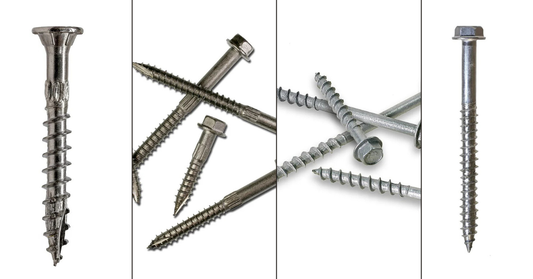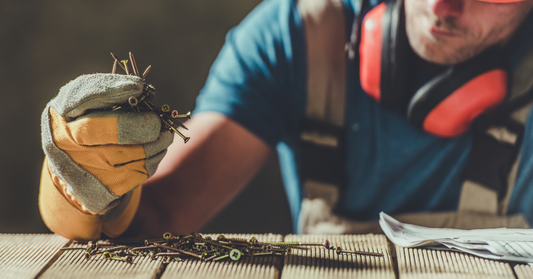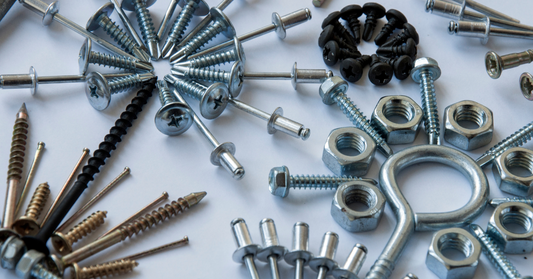Whether you're among the 129 million people living on the coast, or you're building for a client who is, your top priority for outdoor structures by the sea should be their safety and durability.
Salt air can affect metals as far as fifty miles inland from the coast. However, salt air isn’t the only issue that you’ll have to deal with when building your structure.
Using the wrong screws in a coastal environment can result in expensive repairs, replacements, and possible liability concerns. Plus, you deserve the peace of mind that your coastal structure will stand the test of time and not fail in just a few years.
What are Marine Grade Screws?

Marine grade screws and bolts are specialized fasteners designed for harsh coastal environments.
Marine grade fasteners can withstand the corrosive effects of salt in the air, strong winds, storms, high levels of humidity, and the temperature fluctuations typical in coastal areas.
The most common and most used marine screws are the 316 stainless steel screws and bolts.
Important Tip: We recommend you use the 316-grade stainless screws if your structure is within 5 kilometers or 3 miles of the coast.
Why 316 Stainless Steel Screws are the Best Screws for Marine Use
316 stainless steel screws stand out as the best choice for coastal environments due to their composition.
316 Stainless Steel Properties
316 stainless screws are made up of elements that make them the best choice for marine-grade screws. Their combined properties of high corrosion resistance, strength, and durability are crucial for enduring harsh marine environments.
Here’s how those elements make 316 SS screws the best for coastal areas:
Chromium prevents rust on steel by creating a thin layer of chromium oxide on the surface.
Molybdenum helps increase resistance to pitting and crevice corrosion in chloride environments.
Nickel stabilizes the steel's austenitic structure, increasing the screws' toughness and ductility. Nickel also adds to the corrosion resistance properties of chromium.
Iron and carbon are the other elements in the stainless steel, ensuring structural integrity and strength.
Comparing Other Marine Fasteners to 316 Stainless Fasteners
|
Screw Type |
Material Composition |
Corrosion Resistance in Marine Environments |
Advantages |
Limitations |
|
316 Stainless Steel |
Alloy with ≥16% chromium, 10% nickel, and 2% molybdenum |
Excellent |
- Superior resistance to saltwater and chlorides - Highly durable - Ideal for highly corrosive environments |
- More expensive than other common screw options (cost-effective in the long run) |
|
304 Stainless Steel |
Alloy with ≥18% chromium and 8% nickel |
Moderate |
- Good general corrosion resistance - Only ideal in wet environments. - More affordable than 316 screws |
- Less effective in direct, harsh saltwater exposure |
|
Silicon Bronze |
Alloy of copper with silicon and possibly other elements like manganese or tin |
Good |
- Excellent resistance to corrosion and fatigue - Strong and durable - Aesthetic appeal |
- Higher cost compared to 316 stainless steel - Harder to find |
|
Galvanized Steel |
Steel coated with a layer of zinc (hot-dipped or electroplated) |
Fair |
- Cost-effective in non-marine environments - Some protection against rust |
- Zinc corrodes and weakens in saltwater. |
|
Coated Screws |
Various base metals coated with protective materials (e.g., zinc, special paints) |
Fair to Good (depending on coating) |
- Selection of coatings for different conditions - Generally more affordable than stainless steel |
- Coating may degrade quickly in harsh marine environments |
Marine Grade Fasteners for All Coastal Structures
There are a ton of 316 stainless steel screw brands and models that you can choose from to any coastal construction you’re undertaking. Each has its own features and benefits.
Coastal Decks
Eagle Claw’s 316 stainless steel deck screws have countersink heads that you can use for the decking boards themselves, ensuring a flat surface that is free from protrusions. This would be ideal for areas where you walk barefoot or place furniture, as it minimizes tripping hazards and snagging.

Eagle Claw has the same strength and durability as Simpson Strong-Tie’s marine deck screws for decking. Eagle Claw and Simpson 316 stainless steel screws are a versatile option suitable for a wide range of decking applications, including attaching ledger boards, rim joists, and other framing components.
Both Eagle and Simpson Strong-Tie 316 SS deck screws have the type 17 point. This ensures easy penetration into even the toughest wood species.
The Strong-Drive® DWP Stainless Steel Wood Screw has a deep, double-lead thread design that provides exceptional holding power.

Wharves or Piers
If you're putting together wharves or piers, the Strong-Drive® SDS Heavy-Duty Hex Connector Screws are a great choice. These are a better choice than through-bolting and regular lag screws for securing structural connections.
The Strong-Drive® SDWS Structural Stainless Screw is another option you can consider. The strong shank, SawTooth® point, and flat washer head design of the SDWS Structural Screw make sure it holds things together really well, even in tough situations. This helps prevent problems like rust or corrosion that could cause structures to fail over time.
Floating Docks
For tough jobs, like holding together the main parts of the floating dock, the Strong-Drive® SDWS Structural Stainless Steel Screw is a great choice and ensures your floating docks remain stable for a long time.

For assembling hardware parts such as hinges, brackets, or other sturdy fittings, opt for the Strong-Drive® SDS Heavy Duty Hex Connector Screw.
These screws have a hex washer head that makes them super easy to install and take out. Plus, their deep, semi-rounded threads give them great holding power when connecting metal to wood.
Walkways
You can use the DWP Stainless Steel Wood Screw 316 Grade and Eagle Claw's for building walkways.
These screws have a strong thread design that keeps them in place well, making them ideal for attaching the decking boards to the walkway's frame.
Jetties
The Strong-Drive® SDWS Structural and SDS Heavy-Duty Hex Connector Stainless Steel Screws are built for tough jobs, making them ideal for holding together the main parts of jetties, like the decking, framing, and support beams.
For connecting structural elements like brackets, joist hangers, and tie-downs, the Strong-Drive® SDS Heavy-Duty Hex Connector Screw is an excellent option.

Build Stronger Coastal Structures with ATC Construction Fasteners Marine Screws and Bolts
When it comes to marine screws, choose a provider that has decades of experience in coastal construction projects.
ATC Construction Fasteners only partners with brands that are proven to bring you peace of mind, no matter what coastal structure you’re building. Check out our collection of 316 stainless steel fasteners to find which marine screws best fit your project.
FAQs About Stainless Steel 316 Fasteners
What Screws Don't Rust in the Pool?
316 stainless steel screws are ideal for use near pools because they can withstand strong chemicals in pools. 316 stainless steel has molybdenum, which helps it resist rusting, especially in chlorine.
What’s the difference between 304 and 316 marine-grade stainless steel?
The main difference between 304 and 316 marine-grade stainless steel is their composition and how well they resist rust.
304 stainless steel prevents rust and rusting, but it doesn't protect well against saltwater and chlorine. This makes it less ideal for very corrosive environments.
For the most demanding environments, especially with saltwater or chlorine, 316 stainless steel is the best choice because of its superior corrosion resistance.
What Are the Best Screws for Pressure-Treated Wood?
When using pressure-treated wood, which has chemicals to protect it from mold, fungi, and insects, it's important to use specialized screws. Stainless steel screws, especially 316 stainless steel screws, are a good choice because they prevent rust very well.




